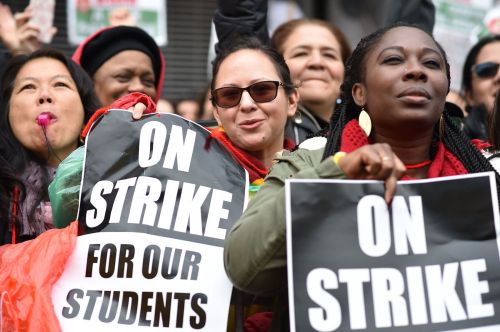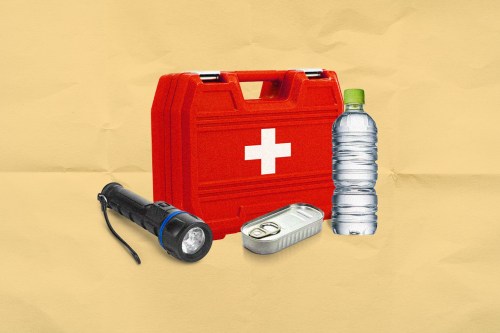Think back to all the schools you went to growing up, and then picture them without the nurse’s office. That’s right, nowhere to seek refuge when you scraped up your knees playing kickball, felt nauseous after downing too many pizza slices at lunch, or unexpectedly got your period during pre-calc. It’s even more distressing than those dreams where you forget your locker combination, right?
Well, that’s the reality for students in Los Angeles’ public schools, who only have nurses on campus part-time—sometimes, as little as one day a week. I was as shocked as you are to learn about this, but it’s part of the reason why around 31,000 of Los Angeles’ teachers and support staff have been on strike for the past five days, without pay. They’re asking for a full-time nurse, five days per week, in all 1,147 schools in the Los Angeles Unified School District (LAUSD). This is in addition to demands that include smaller class sizes and a 6.5 percent pay increase to reflect skyrocketing costs of living in Los Angeles. In response, the district has said it will aim to provide a full-time nurse for all elementary schools during the 2019-2020 school year. But the teachers’ union rejected that offer, saying it wasn’t sufficient to solve the problem.
Emily (who asked me not to use her real name) is an elementary-school speech pathologist participating in the LAUSD teachers strike. She tells me that both schools she’s worked at over the past four years have been without nurses four days a week. (She adds this is fairly standard across the district, at least according to what she’s heard from her colleagues.) “If an accident happens, which is very likely—like, if the kids hit their heads or anything—they’re just sent to the front office and the office manager deals with it,” she says. Emily works with special needs students, including one who has seizures multiple times per day, and admits she wouldn’t know what to do if an emergency were to occur. “It’s really about safety. What if something happens and we don’t know if it’s severe enough to then be sent to the hospital? Every school should have a nurse. It’s just a basic need.”
And in some cases, teachers are being forced to step away from their classes to provide urgent medical care for ill and injured kids, putting the safety of the rest of the rest of their students at risk. After a 12-year-old girl shot two classmates at Los Angeles’ Salvador B. Castro Middle School last year, teacher Joel Parkes was called away from his classroom to perform first aid on a student who was bleeding profusely from her arm. “My mother was a registered nurse, so I knew how to do a tourniquet,” he explained in a video posted by United Teachers Los Angeles. “The principal arrived and I told him we needed a nurse. He told me the nurse was only there two days a week, and this was not one of those days. And I thought ‘Oh, my god, what now?’ The idea that we send 600,000 students to school, and maybe there’s a nurse there and maybe there isn’t a nurse there—I think that is criminally negligent.”
Clearly, there’s a straightforward medical need for nurses in every school. But beyond that, nurses often provide valuable emotional and mental health support for students, even if it’s not part of their job description. (FYI, most Los Angeles schools don’t have a full-time counselor or psychologist, either.) One of my colleagues credits her former school nurse with helping her get through the tumultuous puberty years. “Thanks to agonizing period cramps and hormonal migraines, I spent a lot of time in the nurse’s office in middle school,” she says. “The nurses were always so nice and made sure that I had a place to lie down and be comfortable, and never made me feel embarrassed about what I was experiencing. They created a safe, quiet haven in my massive middle school.”
Another Well+Good staffer used the nurse’s office as a sanctuary when she felt left out. “In middle school, I spent almost every day at lunch in the nurse’s office. Some of my best friends had migrated to a new group, and I had no one to sit with or talk to,” she explains. “At first, I’d fake symptoms to be able to stay, but eventually she got the memo and just accepted me.”
And at my own high school, girls would hang out in our nurse’s office during free periods, chatting to her about their stress around grades, friend drama, or boy issues. She was around our moms’ age, but her non-judgmental vibe—and the idea that she’d seen and heard it all— made us feel safe enough to talk about things that we’d feel uncomfortable sharing with our parents (or our middle-aged male guidance counselor). Sadly, at some Los Angeles schools, there isn’t even a private room for nurses to confidentially speak with students. “At one of our schools, the nurse works in a hallway. Or under the stairwell. A closet,” nurse Stephanie Yellin-Mednick told Vice. This is especially problematic if, say, a student is pregnant or dealing with abuse.
So as Los Angeles teachers wrap up their first full week of striking—and union leaders head into a weekend of negotiations—here’s hoping that they’ll come out on top in the fight for more school nurses. Because, let’s face it, anxiety rates are higher than ever for kids in the United States. And although having a nurse on staff can’t solve that problem, a compassionate professional who can help them feel safe when faced with twisted ankles or test stress is certainly a step in the right direction.
Teachers aren’t the only government employees who are off the clock right now—read more about how the government shutdown is affecting your food and our national parks.
Sign Up for Our Daily Newsletter
Get all the latest in wellness, trends, food, fitness, beauty, and more delivered right to your inbox.
Got it, you've been added to our email list.











